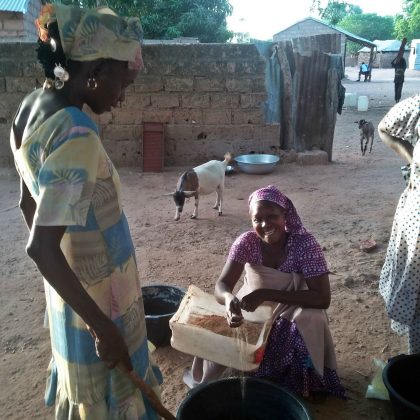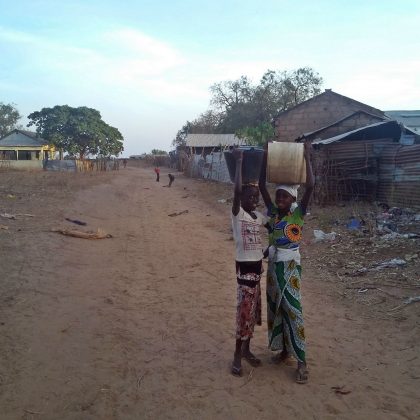This project is made possible through the partnership of WATER CHARITY and the NATIONAL PEACE CORPS ASSOCIATION. ![]()
The participation of Water Charity in this project has been completed.
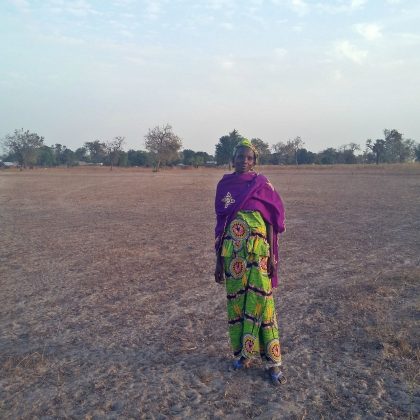 Location
Location
Ker Alhagie Malick, Jokadu District, North Bank Region, The Gambia
Community Description
The village of Ker Alhagie Malick is a Wolof village about 10 Kilometers in the bush in the North Bank Region in The Gambia. The village contains about 70 compounds, mostly large, multi-family, with a population of 1,500 people. Their main source of income is farming coos, early millet or groundnuts. Agriculture is not very diverse, and there are very few home gardens due to the lack of water access.
There is an extremely active women’s group and mothers club. A lower basic school was founded 6 years ago. Although none of the adults in Ker Alhagie Malick attended school or speak English, many are sending their children, including girls, to the school.
Problem Addressed
There is an existing borehole funded by National Nutrition Agency (NaNA) program. The borehole was located in the low ground, and a high elevation of the other end of the community has constrained the adequate flow of water to other areas of the community. Only 5 of the 18 taps are currently working.
The water drawn from the 50-meter well is not safe for drinking or bathing but is the only option of most of the compounds.
Diarrhea is the main health risk for children under 5, and also affects the school attendance rate for older school-going children.
Project Description
This project is to build a water system in the community consisting of the construction of a new borehole, a solar pumping system, storage tanks and towers, and piping to connect the system with the existing borehole.
A Grundfos pump will be connected to the solar panels. A new metal tower will be built, and new storage tanks installed on top. 665 meters of pressure pipe will connect the system.
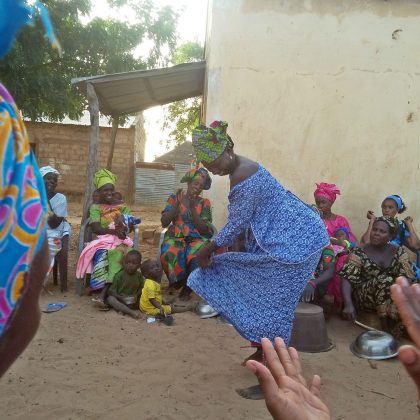 Many members of the community have volunteered their labor as well as homes and food for the workers who will be erecting the borehole. The entire community is involved financially and physically.
Many members of the community have volunteered their labor as well as homes and food for the workers who will be erecting the borehole. The entire community is involved financially and physically.
A water committee, consisting of 5 men and 5 women, is extremely active in the community. The headmaster of the lower basic school is also involved in planning. They represent the needs and wants of the community pertaining to this project. They are responsible for setting up a bank account and collecting 20,000 Dalasi from the community to kick start the account. They are also responsible for collecting 25 Dalasi a month from every adult to put in the bank account after the completion of the project.
The water committee members are eager to attend any and all training about the maintenance and care of the borehole itself. Many of them have expressed excitement about certain health training and educating the community about clean water and the benefits of proper hygiene practices.
Project Impact
Approximately 1,500 people will benefit from access to clean water.
Peace Corps Volunteer Directing Project
Anna Rains
Monitoring and Maintenance
The PCV and the water committee, alongside the headmaster of the lower basic school, are working together to keep the community completely informed about the maintenance and upkeep of the water system.
The water committee is responsible for maintaining the integrity of the pumps as well. The money collected will pay for maintenance and repairs.
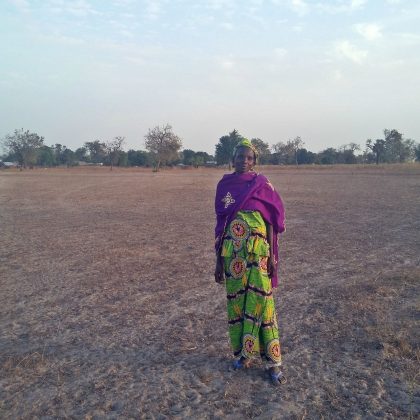 The water committee will be the point of contact for people if there is an issue regarding the water system. They are also constantly coming up with new ideas on how to save and conserve water.
The water committee will be the point of contact for people if there is an issue regarding the water system. They are also constantly coming up with new ideas on how to save and conserve water.
Let Girls Learn
This project is qualified as a Let Girls Learn project. Currently, the burden of hauling water from the 50-meter well falls on younger girls, who are attending school or have left school due to the time spent doing domestic chores. It can take up to 4 hours per day to haul water, waiting at the tap or well and carrying the water back to their compounds. The collection of water is exhausting for them, especially the younger girls who are responsible for their studies, fetching water, cooking, farming, and everything else that girls are expected to manage. Installation of a borehole that can support the entire village will free up a lot of time and energy for these girls to focus on their studies.
For the first time, girls will be traveling to a neighboring village for grade 7. It was expected that many of them would drop out due to their domestic duties. Perhaps this project will free up time to allow them to remain in school.
Project Funding
The funds to get this project underway were initially made available by an anonymous donor. However, the PCV was able to secure other funding for the project, and proceed with it without our financial involvement.
